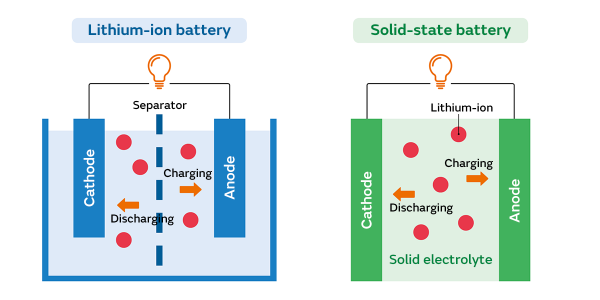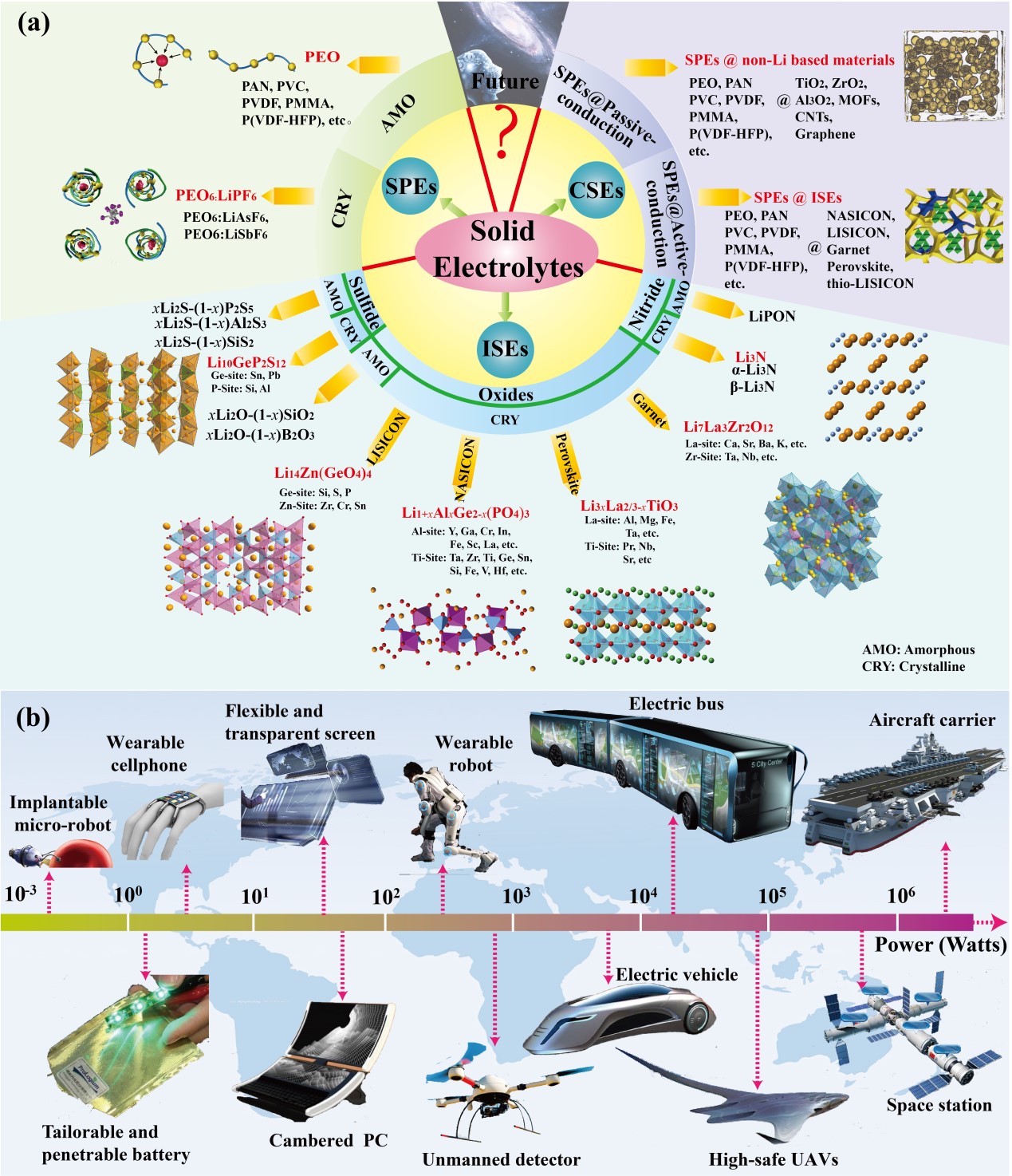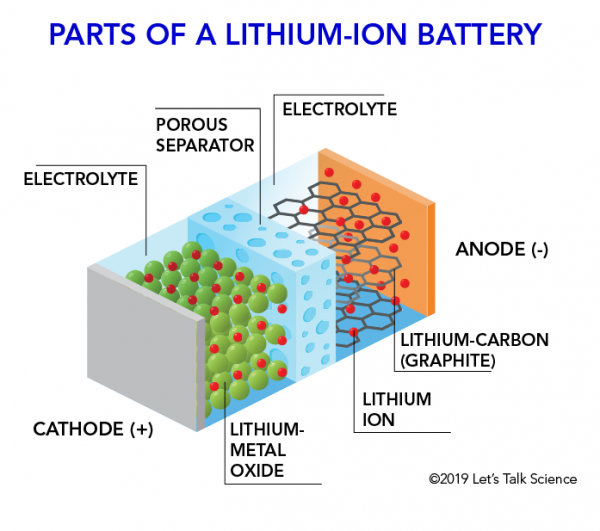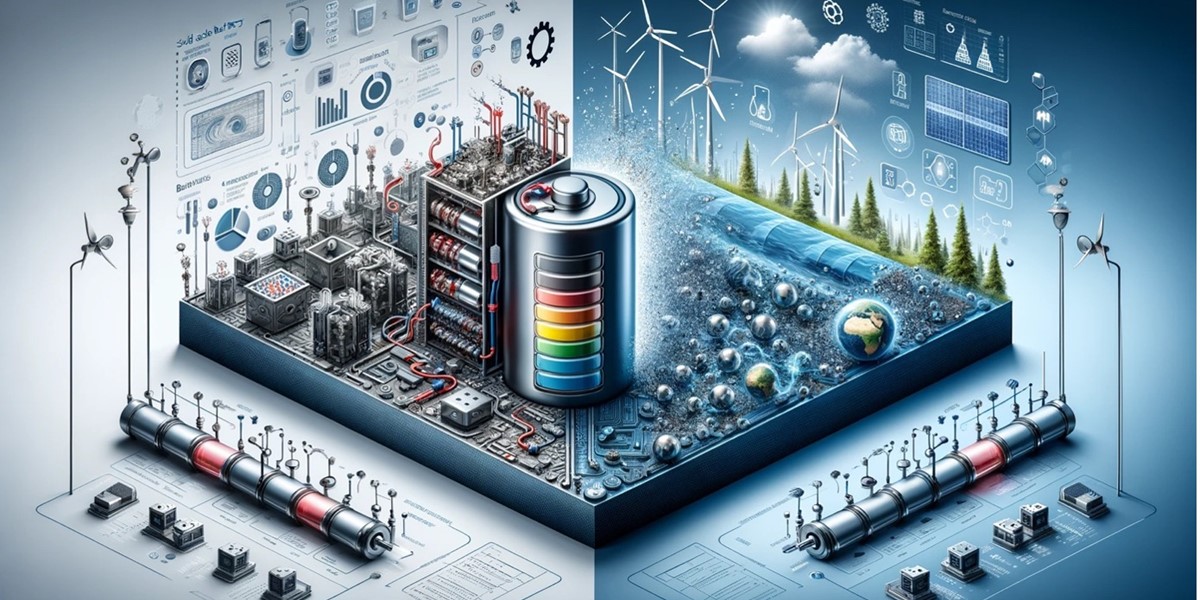
En el mundo de ritmo rápido de hoy, La energía que alimenta nuestros dispositivos es tan importante como los dispositivos mismos. La electricidad se ha convertido en una necesidad para la vida y el trabajo de todos, y en el campo de la electricidad, Las baterías son, sin duda, una parte crucial.
Batería de estado sólido vs ion de litio son los dos tipos de baterías más comunes, y tienen sus propias ventajas y desventajas y su impacto en el futuro. Este artículo lo llevará a una comprensión integral de los diferentes misterios de la batería de estado sólido frente al ion de litio!
Conceptos básicos de Baterías de estado sólido

Definición de batería de estado sólido
Una batería de estado sólido es una batería que utiliza electrodos sólidos y electrolitos sólidos. Esta tecnología de batería utiliza compuestos de vidrio hechos de litio y sodio como materiales conductores. No hay líquido, Pero los sólidos de polímero inorgánico u orgánico sirven como electrolito de la batería.
Cómo funcionan las baterías de estado sólido
El principio de funcionamiento de las baterías de estado sólido se basa en reacciones electroquímicas, que almacenan y liberan energía eléctrica a través de reacciones químicas entre los electrodos positivos y negativos. El corazón de una batería de estado sólido es el uso de un electrolito sólido, que conduce iones.
Cuando la batería está cargada, Los iones de litio migran desde el material de electrodo positivo al material de electrodo negativo, y los electrones fluyen del electrodo negativo al electrodo positivo; Cuando se descarga la batería, Los iones de litio migran desde el material de electrodo negativo al material de electrodo positivo, y los electrones fluyen desde el electrodo positivo hasta el electrodo negativo.
Aplicaciones y ventajas de batería de estado sólido

Aplicaciones
Nuevos vehículos con energía: Las baterías de estado sólido pueden mejorar la seguridad de los nuevos vehículos de energía, ayudar a los vehículos eléctricos a alcanzar una variedad de más que 1,000 kilómetros, y reducir la falla de la batería y los riesgos de incendio.
Sistemas de almacenamiento de energía: Las baterías de estado sólido admiten el almacenamiento y la distribución de la energía renovable y tienen un gran valor para el almacenamiento de energía de la red y el almacenamiento de energía para el hogar. Su capacidad para proporcionar más estable, Las soluciones de almacenamiento de energía a largo plazo son fundamentales para lograr la autosuficiencia energética limpia en los hogares e impulsar una revolución en el consumo de energía..
Aeroespacial y navegación: La aplicación de la tecnología de baterías de estado sólido en el campo de los transbordadores espaciales ha logrado avances significativos.. Por ejemplo, la batería de estado sólido de alta densidad energética desarrollada por la NASA ha demostrado su excelente rendimiento en ambientes extremos.
Electrónica de consumo: Teléfonos inteligentes, Las tabletas y otros productos electrónicos de consumo tienen una demanda creciente de materiales más delgados., Baterías más ligeras y con mayor densidad de energía.. Las baterías de estado sólido pueden satisfacer estas demandas y mejorar la experiencia del usuario..
Drones y dispositivos portátiles inteligentes: La alta densidad de energía y la seguridad de las baterías de estado sólido las hacen ideales para drones y dispositivos portátiles inteligentes., ayudando a mejorar el rendimiento y la seguridad de uso de estos dispositivos.
Ventajas
Alta densidad de energía: Las baterías de estado sólido utilizan electrodos sólidos y electrolitos sólidos.. Comparado con electrolitos líquidos, Los electrolitos de estado sólido tienen una estructura cristalina más estable., hacer que los iones se muevan más eficientemente, entonces las baterías de estado sólido tienen mayor densidad de energía. Esto significa que las baterías de estado sólido pueden almacenar más energía, proporcionando una mayor duración de la batería.
Carga rápida: El electrolito sólido tiene una alta conductividad iónica., para que las baterías de estado sólido puedan lograr una carga rápida, acortando enormemente el tiempo de carga. Además, Las baterías de estado sólido pueden admitir métodos de carga de mayor potencia., mejorando aún más la eficiencia de carga.
Buena seguridad: Las baterías líquidas tradicionales tienen riesgos de seguridad como fugas y explosiones., mientras que las baterías de estado sólido utilizan electrolitos sólidos, que no son fáciles de filtrar o explotar, para que estén más seguros.
Buen rendimiento de baja temperatura: In entornos de baja temperatura, La viscosidad de los electrolitos líquidos aumentará, afectando la velocidad de conducción de iones, Pero los electrolitos sólidos no se ven afectados por esto, Por lo tanto, el rendimiento de las baterías de estado sólido en entornos de baja temperatura es más estable.
Ciclo de vida largo: Como un solo conductor de iones, El electrolito sólido no causará reacciones laterales, Evitar la formación de una película de interfaz de electrolito sólido durante el proceso de carga y descarga, evitando así la disminución del problema de la capacidad. Por lo tanto, Las baterías de estado sólido tienen una vida útil más larga.
Conceptos básicos de baterías de iones de litio
Definición de batería de iones de litio
Las baterías de litio son un tipo de batería que utiliza metal de litio o aleación de litio como material de electrodo negativo y utiliza una solución de electrolito no acuoso. Este tipo de batería puede ser una batería principal o una batería de almacenamiento., Y se basa principalmente en el movimiento de iones de litio entre los electrodos positivo y negativo para funcionar.. Las baterías de litio tienen una alta densidad de energía y se utilizan ampliamente en equipos electrónicos., vehículos eléctricos, y sistemas de almacenamiento de energía.
Cómo funcionan las baterías de iones de litio

Las baterías de iones de litio almacenan y liberan energía moviendo iones de litio entre los electrodos positivo y negativo.. Durante el proceso de carga, Los iones de litio fluyen desde el electrodo positivo. (compuesto de litio) al electrodo negativo (material de carbono o silicio). Durante el proceso de alta, Los iones de litio pasan del electrodo negativo al electrodo positivo.. Esta reacción se produce por conducción iónica en el electrolito..
Aplicaciones y ventajas de batería de iones de litio
Aplicaciones
Electrónica de consumo: como teléfonos inteligentes, tabletas, portátiles, cámaras digitales, etc..
herramientas eléctricas: incluyendo destornilladores eléctricos, taladros electricos, sierras electricas, etc..
Vehículos de nueva energía.: Como principal fuente de energía para vehículos puramente eléctricos., vehículos híbridos y vehículos híbridos enchufables.
Sistema de almacenamiento de energía: Sistema de almacenamiento de energía para fuentes de energía renovables como la solar y la eólica., así como equipos de almacenamiento de energía para redes inteligentes.
Equipo medico: como marcapasos, medidor de glucosa en sangre, máquina de ultrasonido B, etc..
Equipos industriales: incluyendo equipos de automatización industrial, robots, drones, etc..
campo militar: utilizado en equipos de comunicación militar, armas y equipos del sistema de navegación, etc..
Aeroespacial: La alta densidad de energía y la larga vida útil de las baterías de litio las hacen ampliamente utilizadas en el campo aeroespacial., como fuentes de alimentación auxiliares para aviones, sistemas de energía para transbordadores espaciales, etc..
Equipo financiero y de seguridad.: incluyendo terminales de pago móviles, camaras de vigilancia, alarmas, etc..
Ventajas
Alta densidad de energía: La densidad de energía de las baterías de litio es mucho mayor que la de las baterías tradicionales de plomo-ácido y las de níquel-hidruro metálico., lo que significa que con el mismo peso, Las baterías de litio pueden almacenar más energía., que hace que las baterías de litio sean adecuadas para aplicaciones que requieren aplicaciones de alta densidad de energía.
Vida larga: Las baterías de litio generalmente tienen una vida útil más larga que las baterías de ácido con plomo y las baterías de hidruro de níquel, que puede reducir la frecuencia de los costos de reemplazo y mantenimiento de la batería.
Baja tasa de autodescarga: Las baterías de litio tienen una baja tasa de autodescargo y pueden mantener una carga alta incluso si no se usan durante mucho tiempo. Esto hace que las baterías de litio sean adecuadas para dispositivos que requieren almacenamiento a largo plazo., como los sistemas de almacenamiento de energía solar.
Carga rápida: Las baterías de litio se pueden cargar rápidamente, lo que reduce enormemente el tiempo de carga y mejora la eficiencia del uso.
Protección ambiental: Las baterías de litio no contienen sustancias ambientalmente dañinas, como el plomo, cadmio, etc., Entonces tienen menos impacto en el medio ambiente. Además, Las baterías de litio pueden reducir los desechos de recursos a través del reciclaje y la reutilización.
Ligero y compacto: Las baterías de litio son livianas y relativamente pequeñas, lo que los hace ideales para su uso en dispositivos portátiles.
Alto voltaje: Las baterías de litio pueden soportar voltajes más altos y son adecuados para conducir equipos de alta potencia, tales como vehículos eléctricos y herramientas eléctricas de alto rendimiento.
Amplio rango de temperatura de funcionamiento: Las baterías de iones de litio pueden funcionar en un rango de temperatura de -25 ° C a 60 ° C y son adecuadas para una variedad de condiciones ambientales.
Sin efecto de memoria: Las baterías de iones de litio no tienen efecto de memoria, lo que significa que se pueden cargar en cualquier momento sin dañar la duración de la batería.
4 Comparaciones de la batería de estado sólido frente al ion de litio
Número de recargas
Típicamente, La vida de una batería de iones de litio está cerca 500 a 1,000 ciclos de carga y descarga. Sin embargo, Las baterías de estado sólido pueden extender en gran medida su vida debido a su estructura especial, y algunos incluso pueden lograr más ciclos de carga y descarga.
Seguridad
Las baterías de estado sólido ofrecen mayor seguridad. Porque utiliza un electrolito sólido., Evita fugas que pueden ocurrir durante el uso de la batería líquida., y es menos probable que explote incluso bajo un impacto severo.
Densidad de energía
La densidad de energía de las baterías de estado sólido puede alcanzar 2 a 3 veces mayor que las baterías de iones de litio. Esto significa que las baterías de estado sólido pueden almacenar más energía con el mismo peso..
Costo
Las baterías de estado sólido son actualmente más caras y tienen procesos de fabricación complejos. El coste es mayor que el de las baterías de iones de litio y no es fácil producirlas en grandes cantidades.. Las baterías de iones de litio existen desde hace más tiempo y son más baratas de fabricar..
El futuro de la batería de estado sólido frente al ion de litio

Baterías de estado sólido
A medida que la tecnología de baterías de estado sólido continúa avanzando, su costo está disminuyendo gradualmente, y las baterías de estado sólido se convertirán en una fuerza importante para promover el desarrollo de la industria. Tiene mayor potencial para transformar el almacenamiento de energía en el futuro.. Las baterías de estado sólido son más seguras, tener alta densidad de energía, tienen una larga vida útil y capacidades de carga rápida.
Sin embargo, debido a la presencia de ánodos de litio metálicos y electrolitos sólidos, El proceso de fabricación de las baterías de estado sólido es muy diferente al de las baterías de iones de litio.. Por lo tanto, Todavía es un desafío conectar la producción de baterías de estado sólido con aplicaciones comerciales en el futuro..
Baterías de iones de litio
Baterías de iones de litio con las ventajas de una alta densidad de energía, alta densidad de potencia, y un ciclo de vida largo han ocupado una posición importante en la electrónica de consumo, fuentes de alimentación de almacenamiento de energía, transporte electrico, equipo militar, aeroespacial y otros campos en el pasado 30 años.
Actualmente, con el auge de campos de tecnología energética avanzada, como los vehículos eléctricos, almacenamiento de energía a gran escala, redes inteligentes, y energía internet, Las baterías de iones de litio han penetrado en todos los aspectos de nuestras vidas., incluyendo teléfonos móviles, portátiles, y vehículos eléctricos. Con el avance continuo de la tecnología y la expansión de los campos de aplicación., Las baterías de iones de litio seguirán desempeñando un papel importante y contribuyendo al desarrollo de la sociedad humana..
Conclusión
Comparando cuidadosamente la batería de estado sólido con la de iones de litio, podemos descubrir sus respectivas fortalezas y áreas de mejora. Aunque las baterías de estado sólido ofrecen mayor seguridad y una densidad de energía potencialmente mayor, Las baterías de iones de litio siguen dominando muchas aplicaciones..
Como ocurre con cualquier compra importante., si tienes necesidades de batería, Necesitas considerar tus opciones. GYCX es un experto de la industria único, puede Contáctenos. Si está interesado en combinar el almacenamiento de la batería con su sistema, Puede hacer clic aquí para obtener una cotización inmediata.
